The Global Key Populations HIV Prevention Pre-Conference is a groundbreaking pre-conference, aimed at revolutionizing HIV prevention for key populations and LGBTQI communities, is set to take place in Munich, Germany, on July 20th, 2024. Organized by the Global Black Gay Men Connect (GBGMC) in collaboration with the Key Population Advisory Group, AVAC, Coalition PLUS, and Fierté Afrique Francophone this event is a critical precursor to the 25th International AIDS Conference.
Avac Event
Global Key Populations HIV Prevention Pre-Conference
Join us for CROI 2024!
AVAC and partners have worked to follow and explain the research presented at CROI for many years, making the science more accessible, connecting the findings to community priorities, and ensuring civil society and affected communities are represented within the program, and ultimately the research.
Join us at CROI 2024!
Dear Advocate,
The 31st annual Conference on Retroviruses and Opportunistic Infections (CROI) kicks off this weekend, and runs from March 3-6 in Denver, Colorado. CROI is the go-to forum for groundbreaking science in the HIV field, and this years’ program is full of exciting new research.
At AVAC, we’re tracking data and discussion on long-acting, injectable PrEP; the dapvirine vaginal ring (DVR) in pregnancy; doxycycline as post-exposure prophylaxis (DoxyPEP) to prevent sexually transmitted infections (STIs); and the latest in HIV cure and control. We’re also very excited for this year’s Martin Delaney Presentation – Unveiling the Power of Uganda’s LGBTIQ Advocacy in Shaping HIV Response and Health Care Access – that will be delivered by Frank Mugisha of Sexual Minorities Uganda (SMUG) in Uganda and couldn’t be more timely. Be sure to check out the conference program.
AVAC and partners have worked to follow and explain the research presented at CROI for many years, making the science more accessible, connecting the findings to community priorities, and ensuring civil society and affected communities are represented within the program, and ultimately the research. For those attending or not, this email shares ways to follow along and join in the discussion and debate.
Follow Along
Be part of the conversation by following AVAC on X (Twitter) at @hivpxresearch for real-time updates using the conference hashtag #CROI2024, and be sure to sign up and follow our partner, Aidsmap, who will be reporting from the conference.
Community Breakfast Clubs (CROI registration not required
Join the CROI Community Liaisons, AVAC, the European AIDS Treatment Group, and partners for daily Community Breakfast Clubs. These virtual webinars feature researchers and advocates discussing some of the most consequential science being presented at CROI. They are open to all, CROI registrants and non-registrants alike.

Monday, 4 March, 7:00am – 8:00am MT (Click here to determine the time in your location.)
Spotlight on Social and Behavioural Science at CROI 2024
Tuesday, 5 March, 7:00am – 8:00am MT (Click here to determine the time in your location.)
Living with HIV for a Lifetime – It’s Complicated
Wednesday, 6 March, 7:00am – 8:00am MT (Click here to determine the time in your location.)
Looking forward to seeing you at the daily Breakfast Club sessions and to working together to unpack the research and be sure it is applied!
Best,
AVAC
Avac Event
Decolonizing Global Public Health: Exploring the how, from now til as long as it takes
An interactive and thought-provoking discussion, this webinar critically examined a trend of historical legacies and power dynamics which if not checked, continue to shape global public health.
Participants engaged in deep reflection and dialogue to understand how colonialism, imperialism, and other systems of oppression have influenced the development and implementation of public health policies, practices, and research methodologies. The webinar further explored and contextualized strategies and approaches for decolonizing public health to promote equity and justice.
Speakers:
- Preethi John, University College London
- Bridget Malewezi, Mothers2mothers Malawi
- Mareli Claassens, University of Namibia
- Julieta Kavetuna, Member of Parliament, Namibia
Moderator:
- Alice M. Kayongo – O’Neill Institute for National and Global Health Law
AVAC in Conversation with NIAID’s Jeanne Marrazzo
The new director of National Institute of Allergy and Infectious Diseases (NIAID), Dr. Jeanne Marrazzo joined AVAC Executive Director in conversation.
Tell Congress to Reject Cuts and #SaveHIVFunding
Join us in telling Congress to reject cuts and #SaveHIVFunding by sending letters to your Congressional representatives.
Decolonizing Global Health in 2024 and Beyond
In the year ahead, staking out a course that will advance the HIV response and global health equity faces serious headwinds.
Avac Event
CROI 2024
The 31st annual Conference on Retroviruses and Opportunistic Infections (CROI) took place from March 3-6 in Denver, Colorado. CROI is the go-to forum for groundbreaking science in the HIV field, and this years’ program was full of exciting new research.
AVAC Daily Dispatches
AVAC sent out daily dispatches summarizing each day’s news out of CROI:
Community Breakfast Clubs
The CROI Community Liaisons, AVAC, the European AIDS Treatment Group, and partners for daily Community Breakfast Clubs organized the daily Community Breakfast Club. These virtual webinars featured researchers and advocates discussing some of the most consequential science being presented at CROI.
Recordings and transcripts available here.
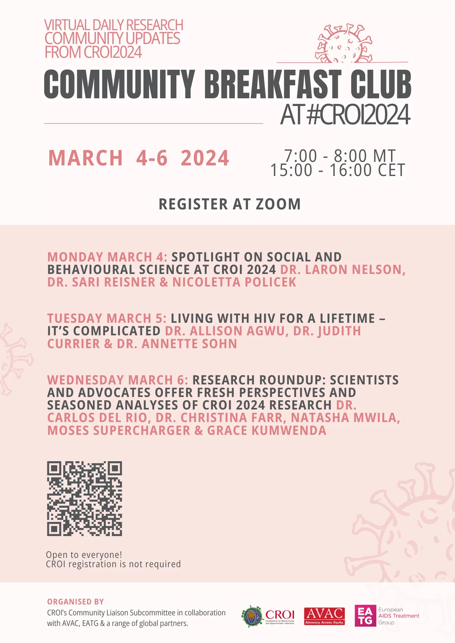
What You Should Know About the FAPP, GAPP and PEPFAR Reauthorization
Engaging the US government is vital to advocacy for HIV prevention, as one of the world’s largest contributors to implementation and research and development. The reach and scale of US funded global health programs have profound impact on the lives and health of people in the US and around the world. Two coalitions, founded by advocates, make it their central mission to inform and influence the US federal government to advance funding and policies to end the HIV epidemic.
In 2024, their work will be as important as at any time in the history of HIV advocacy; as funding for US programs is at stake and advocacy continues for the reauthorization of PEPFAR, one of the greatest US foreign policy and global development achievements in history.
AVAC’s John Meade was just elected co-chair of the Federal AIDS Policy Partnership (FAPP), a national coalition of more than 120+ local, regional, and national organizations advocating for federal funding, legislation and policy to end the HIV epidemic in the United States. John and co-chairs, Mike Weir of NASTAD and Kathie Hiers of AIDS Alabama, will support the work of seven affiliated working groups, including the AIDS Budget and Appropriation Coalition and the Research Working Group, to produce analysis, build relationships with federal entities, and champion policies and funding that are essential to making progress.
And AVAC’s Suraj Madoori co-chairs the Global AIDS Policy Partnership(GAPP), a 70 member coalition that leads advocacy for continued robust funding, expansion and improvement of US global HIV/AIDS programming through PEPFAR and the Global Fund. With co-chairs Katie Lapides Coester of EGPAF and Shannon Kellman, formerly of Friends of the Global Fight, now at UNAIDS, this coalition — comprised of civil society and faith-based organizations, funders, professional membership organizations and organizations that implement programs — will continue working every channel to spotlight success, combat misinformation and seize opportunities to secure a new five-year reauthorization of PEPFAR. See AVAC’s blog here.
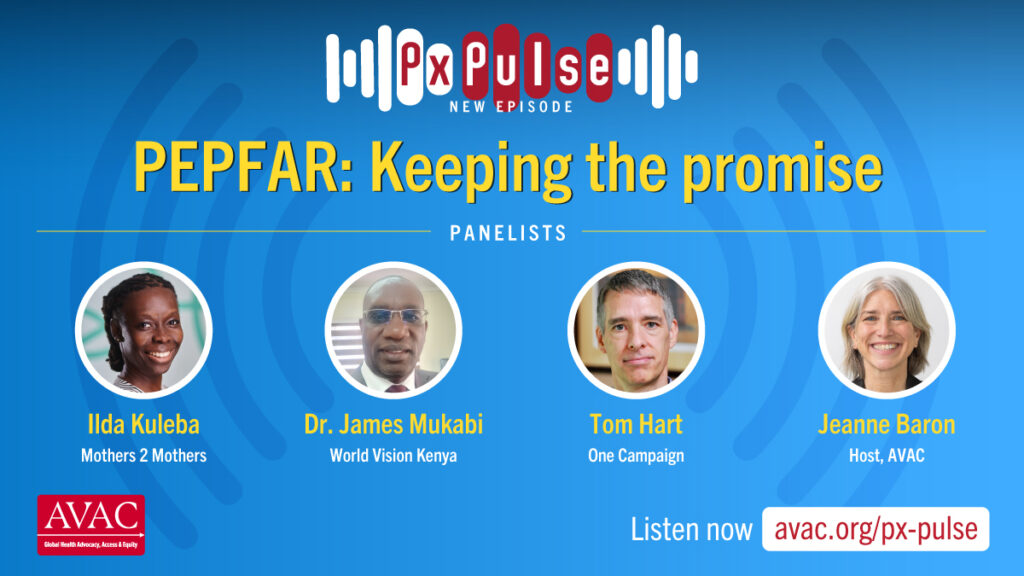
Since its creation in 2003 and through previous 5-year reauthorizations, PEPFAR has received near universal, bipartisan support in Congress. This past year, partisan lobbyists and their congressional allies derailed easy passage of its next 5-year reauthorization. In 2024, the GAPP will be mobilizing against efforts to politicize this singularly successful program, and will be working for renewed bipartisan support through the final resolution of federal budget negotiations.
The efforts of the GAPP and the FAPP will remain essential to ensure sustained funding for efforts to end the epidemic, to save overall HIV funding and advance a national PrEP program in the US, and to win the reauthorization of PEPFAR. Be sure to watch this space for updates.
Webinars to Look Out for in February!
2024 is off and running and a slew of webinars are on the calendar. This selection of topics is both broad and deep, providing updates on the pipeline from cure to vaccines, insights on critical advocacy, a conversation with the new director of NIAID, and opportunities for you to engage. Scroll down for what’s coming up and recordings of webinars from December and January that you may have missed.
Coming up!
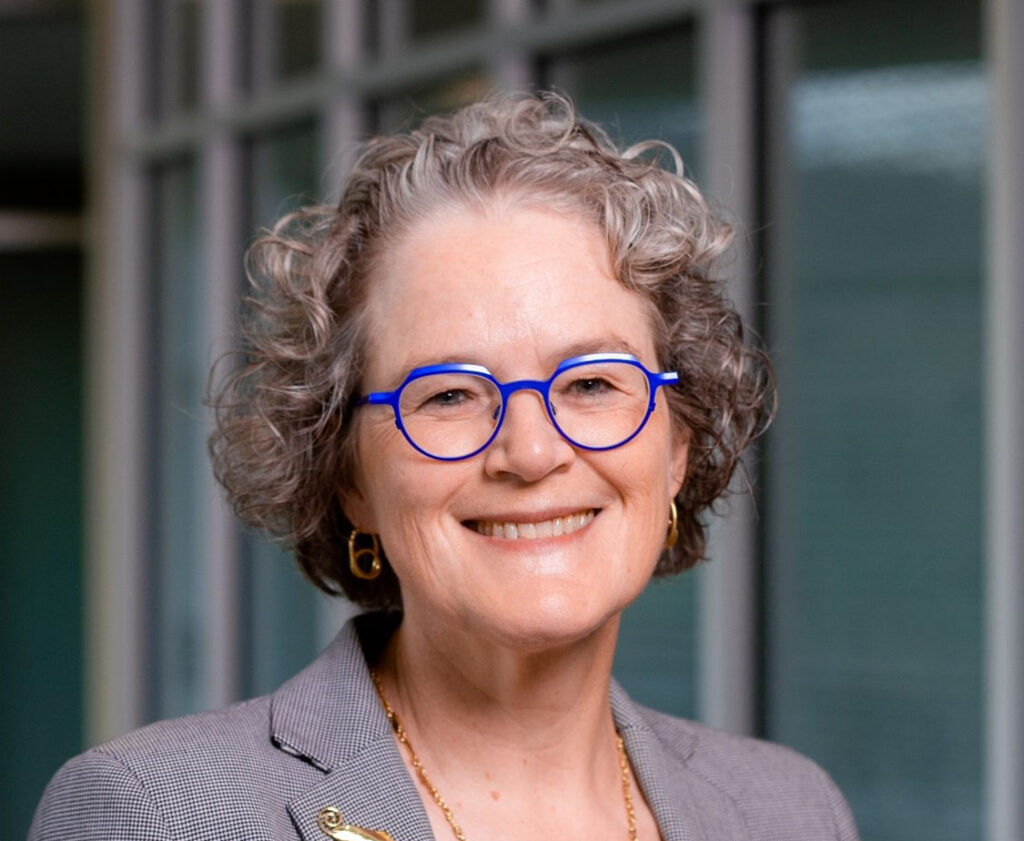
AVAC in Conversation with NIAID’s Jeanne Marrazzo
February 27, 11:30 am – 12:00 pm EST
Join AVAC in conversation with the new Director of NIAID, Jeanne Marrazzo. Register here.
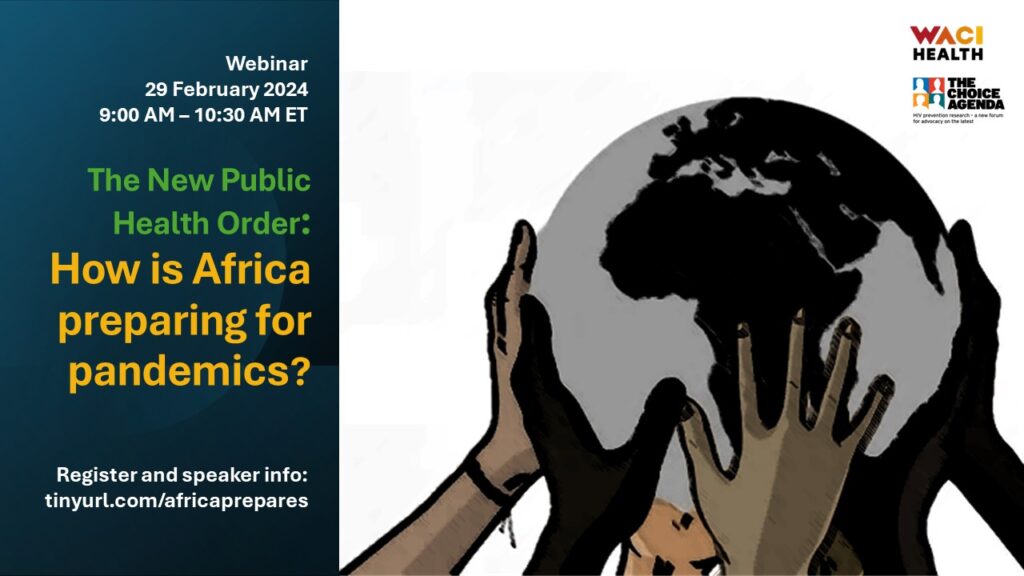
The New Public Health Order: How is Africa preparing for pandemics?
February 29, 9:00-10:30 am EST
WACI Health and The Choice Agenda invite you to join us for a webinar introducing key initiatives of the Africa CDC and the African Union. It will illuminate roles for civil society and community engagement. Register here.
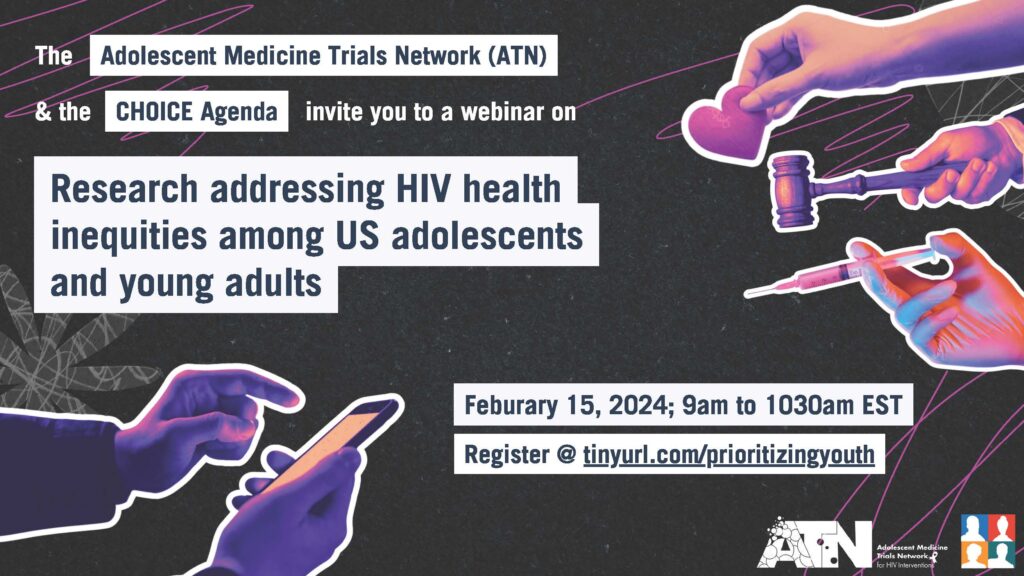
Join The Choice Agenda for an overview of the newest cycle of the Adolescent Medicine Trials Network! This webinar includes highlights of: ATN 165: Linking Youth to PrEP Services, which tests an innovative mobile delivery and mHealth intervention for PrEP adherence and persistence among sexual minority men; ATN 167: Legal, Economic, and Affirming Peer Support (LEAP) for transgender and gender diverse youth; and how the network prioritizes and amplifies the voices of youth directly impacted by the ATN’s pivotal research. Register here.
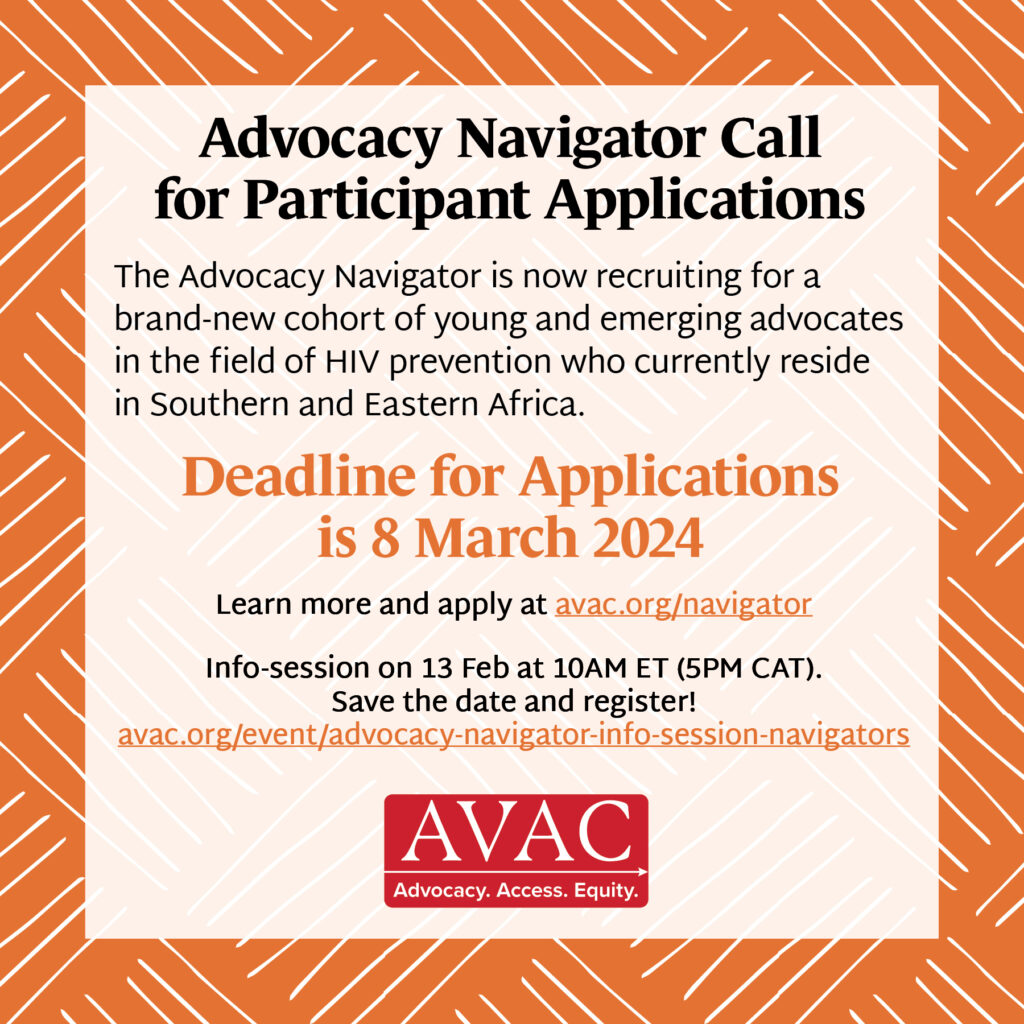
Advocacy Navigator Program Info Session
February 13, 10:00-11:00 am EST
This webinar is intended for anyone interested in applying to participate in AVAC’s Advocacy Navigator program. The session will provide an overview of the program, expectations, eligibility, and application process, followed by Q&A with the AVAC team.
In case you missed it!
Reporting the African Science Story: Decoding scientific research to support public health in Africa
Through the Media Science Café Program, AVAC partners with health media associations in Kenya, Tanzania, Uganda, Zambia and Zimbabwe to bring journalists together with researchers, implementers, civil society, policy makers, regulators and policy makers to build relationships that will foster accurate reporting of HIV, COVID and other science or health stories in those countries. Learn about the model! Recording, slides and resources.
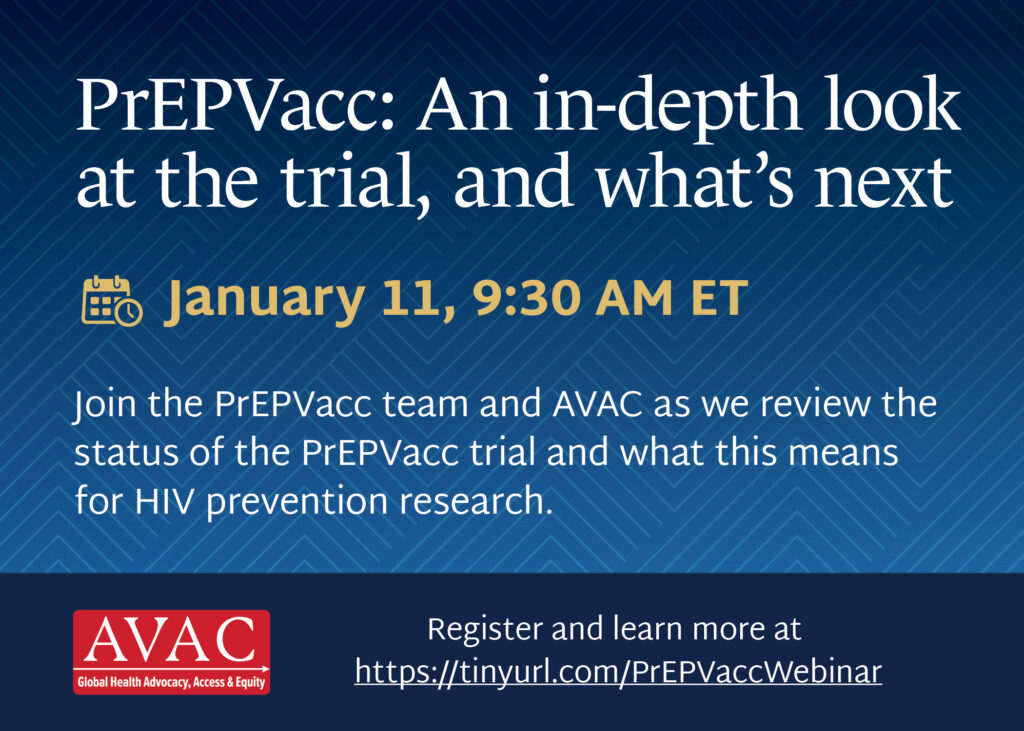
PrEPVacc: An in-depth look at the trial, and what’s next
This webinar reviewed key aspects of PrEPVacc, including its innovative study design, implementation, integrated social science, and data analysis plans. An engaging conversation about what we’ve learned from PrEPVacc, what we can still learn, and what this may mean for the HIV prevention field. Recording, slides and resources.
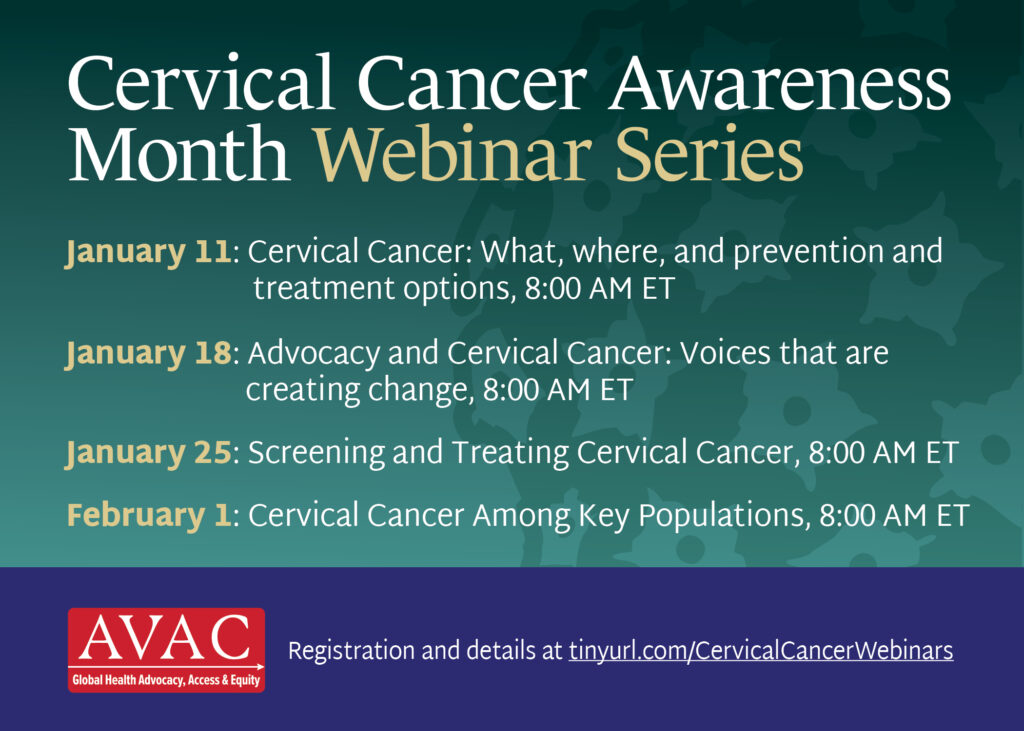
Cervical Cancer Awareness Month Webinar Series
Check out our 4-part webinar series on cervical cancer, which featured a deep dive on: what cervical cancer is, who is impacted, and prevention and treatment options; advocacy strategies to bring more attention to cervical cancer and its impact on communities; options for screening and treating cervical cancer along with ongoing research; and the impact of cervical cancer on key populations and those vulnerable to HIV infections. Recording, slides and resources.
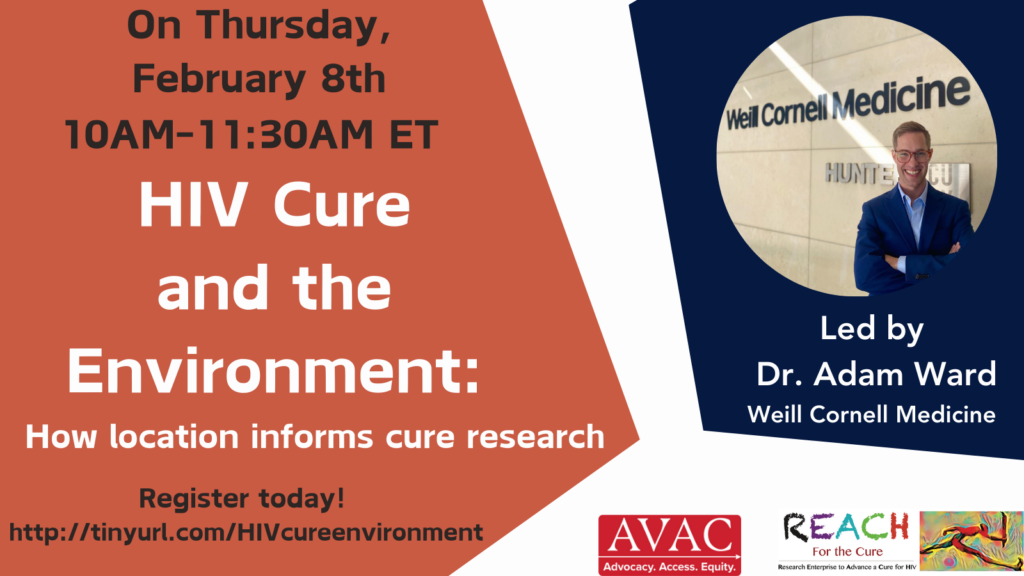
HIV Cure and the Environment: How location informs cure research
This webinar reviewed core concepts discussed in the previous webinar, Let’s Talk About HIV Cure Research: An Introduction to the science under investigation, and introduced how the environment may impact cure strategies. Recording, slides and resources.

Learn more about the townhall discussion on Black Gay Men and HIV in the US featuring influential figures in the Black Gay community, including Ace Robinson, Daniel D. Driffin, and Kenyon Farrow by checking out highlights on AVAC’s Twitter page and watch the full recording.
Thanks for checking out these conversations. We hope you will join us in these rich discussions and watch this space for future webinars!